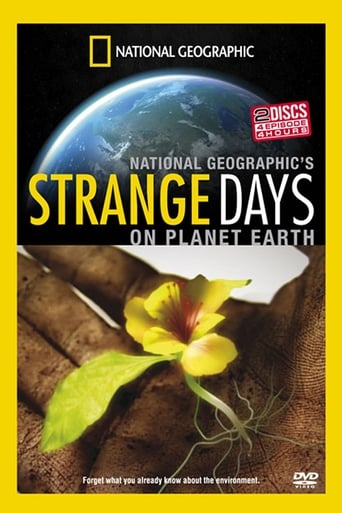Strange Days on Planet Earth Season 1

Strange Days on Planet Earth is a four-part television program on PBS concerning human impact on the environment. It is narrated by Edward Norton. The show was produced by Sea Studios Foundation. Strange Days on Planet Earth grew into an ongoing partnership with the National Geographic Society to bring focus on our personal connection to the planet’s life systems. The series were broadcast on PBS to over 12 million viewers in the U.S. and millions more in Europe, Latin America, Australia, and New Zealand. In 2007–2008, the Strange Days initiative focused on the global issues acing the ocean, under the name Strange Days Ocean.
Watch NowWith 30 Day Free Trial!
Strange Days on Planet Earth
2005
Strange Days on Planet Earth is a four-part television program on PBS concerning human impact on the environment. It is narrated by Edward Norton. The show was produced by Sea Studios Foundation. Strange Days on Planet Earth grew into an ongoing partnership with the National Geographic Society to bring focus on our personal connection to the planet’s life systems. The series were broadcast on PBS to over 12 million viewers in the U.S. and millions more in Europe, Latin America, Australia, and New Zealand. In 2007–2008, the Strange Days initiative focused on the global issues acing the ocean, under the name Strange Days Ocean.
Watch Trailer
Strange Days on Planet Earth Season 1 Full Episode Guide
Frogs are vanishing in America’s heartland. Canadian beluga whales are mysteriously dying in the Saint Lawrence River. Swarms of sea stars are overrunning parts of Australia's Great Barrier Reef. Are these signals that something is amiss in Earth’s water – from our marshes to the sea? Has water become a massive delivery system for pollutants?
Around the world, from the forests of Venezuela to Yellowstone’s majestic wilderness to the Caribbean’s coral reefs, researchers are discovering predators play a vital role in the health of our natural systems. Knowing this, should we learn to live with predators? Can we?
Dust clouds are building high over the Atlantic. An entire population of caribou is declining, while other species are pushed to the limits of their physical survival in the oceans. A respiratory illness, once uncommon among children in Trinidad, is now widespread. Amazingly, many scientists now believe these disparate phenomena may be linked to global climate change.
Across the world, plants and animals are silently finding their way into places where they don't belong. These interlopers, called invasive species, have enormous powers — they spread disease, they devour our buildings. Some are destroying the very land under our feet. Odds are these species that evolved in one place and now live destructively in another may have even infiltrated your own backyard.
Free Trial Channels
Seasons


























